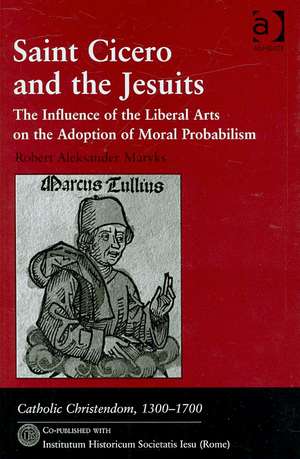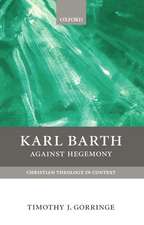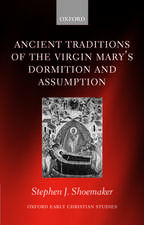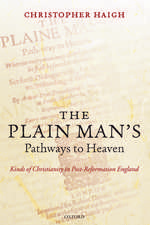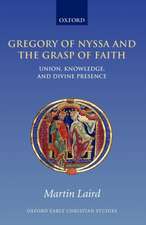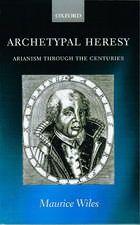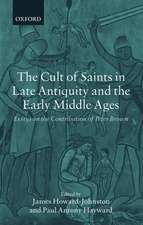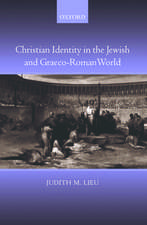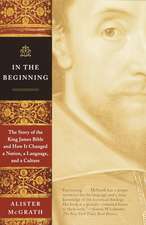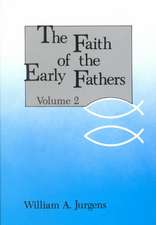Saint Cicero and the Jesuits: The Influence of the Liberal Arts on the Adoption of Moral Probabilism: Catholic Christendom, 1300-1700
Autor Robert Aleksander Maryksen Limba Engleză Hardback – 14 aug 2008
Din seria Catholic Christendom, 1300-1700
- 9%
 Preț: 1038.14 lei
Preț: 1038.14 lei - 15%
 Preț: 269.84 lei
Preț: 269.84 lei - 18%
 Preț: 1000.27 lei
Preț: 1000.27 lei -
 Preț: 388.13 lei
Preț: 388.13 lei -
 Preț: 416.22 lei
Preț: 416.22 lei - 25%
 Preț: 825.06 lei
Preț: 825.06 lei -
 Preț: 416.22 lei
Preț: 416.22 lei -
 Preț: 469.34 lei
Preț: 469.34 lei - 18%
 Preț: 1055.69 lei
Preț: 1055.69 lei - 18%
 Preț: 1054.71 lei
Preț: 1054.71 lei - 18%
 Preț: 1060.25 lei
Preț: 1060.25 lei - 18%
 Preț: 1008.17 lei
Preț: 1008.17 lei - 18%
 Preț: 1062.62 lei
Preț: 1062.62 lei -
 Preț: 436.14 lei
Preț: 436.14 lei - 18%
 Preț: 1063.41 lei
Preț: 1063.41 lei - 15%
 Preț: 259.31 lei
Preț: 259.31 lei - 31%
 Preț: 767.95 lei
Preț: 767.95 lei -
 Preț: 465.39 lei
Preț: 465.39 lei - 18%
 Preț: 1059.45 lei
Preț: 1059.45 lei - 16%
 Preț: 237.38 lei
Preț: 237.38 lei - 18%
 Preț: 1054.71 lei
Preț: 1054.71 lei - 18%
 Preț: 1060.74 lei
Preț: 1060.74 lei - 25%
 Preț: 769.92 lei
Preț: 769.92 lei -
 Preț: 436.14 lei
Preț: 436.14 lei - 18%
 Preț: 1054.71 lei
Preț: 1054.71 lei -
 Preț: 436.14 lei
Preț: 436.14 lei - 18%
 Preț: 1061.81 lei
Preț: 1061.81 lei - 28%
 Preț: 822.76 lei
Preț: 822.76 lei - 18%
 Preț: 1116.27 lei
Preț: 1116.27 lei - 18%
 Preț: 1056.14 lei
Preț: 1056.14 lei - 18%
 Preț: 1000.27 lei
Preț: 1000.27 lei - 16%
 Preț: 299.52 lei
Preț: 299.52 lei - 16%
 Preț: 260.73 lei
Preț: 260.73 lei - 28%
 Preț: 821.53 lei
Preț: 821.53 lei - 18%
 Preț: 1005.01 lei
Preț: 1005.01 lei - 28%
 Preț: 820.71 lei
Preț: 820.71 lei - 18%
 Preț: 1008.86 lei
Preț: 1008.86 lei
Preț: 1109.18 lei
Preț vechi: 1352.65 lei
-18% Nou
Puncte Express: 1664
Preț estimativ în valută:
212.27€ • 220.79$ • 175.24£
212.27€ • 220.79$ • 175.24£
Carte tipărită la comandă
Livrare economică 12-26 aprilie
Preluare comenzi: 021 569.72.76
Specificații
ISBN-13: 9780754662938
ISBN-10: 0754662934
Pagini: 182
Dimensiuni: 156 x 234 x 13 mm
Greutate: 0.45 kg
Ediția:1
Editura: Taylor & Francis
Colecția Routledge
Seria Catholic Christendom, 1300-1700
Locul publicării:Oxford, United Kingdom
ISBN-10: 0754662934
Pagini: 182
Dimensiuni: 156 x 234 x 13 mm
Greutate: 0.45 kg
Ediția:1
Editura: Taylor & Francis
Colecția Routledge
Seria Catholic Christendom, 1300-1700
Locul publicării:Oxford, United Kingdom
Notă biografică
Robert Aleksander Maryks is an Assistant Professor in the Department of History at the City University of New York.
Recenzii
’To conclude with, Maryks’s is a must-read book for intellectual historians, historians of moral theology, and researchers in the field of Jesuit studies.’ Ephemerides Theologicae Lovanienses ’This book is richly documented and meticulous. ... Maryks guides us through complex Latin treatises that few readers today would be able to disentangle.’ Sixteenth Century Journal
Cuprins
Introduction; Chapter 1 Early Jesuit Ministries; Chapter 2 “What has Athens to do with Jerusalem?”; Chapter 3 “Christian Virtue and Excellence in Ciceronian Eloquence”; Chapter 4 The Genealogy of Jesuit Probabilism; Chapter 5 Probabilism as the Spiritual Sodom; Chapter 101 Conclusion;
Descriere
Over the past decade various historians have examined the consequences of Ignatius Loyola's decision to involve his newly approved Society of Jesus in various educational enterprises. The first Jesuits emphasized the importance of spiritual conversation, preaching, and reconciliation, horizontally and vertically. In this monograph, Maryks argues that Jesuit interest in classical learning prompted them to re-examine their own concepts of conscience and confession, leading them to increasingly abandon traditional concepts of putting the demands of the law above the calls of their own conscience. By integrating concepts of theology and classical humanism, this book offers a compelling account of how diverse forces could act upon a religious order to alter the central beliefs they held and promulgated.
